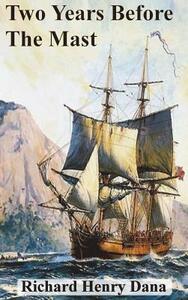Take a photo of a barcode or cover
challenging
sad
tense
slow-paced
Graphic: Death, Drug abuse, Emotional abuse, Physical abuse, Colonisation
My high school science teacher recc'ed me this book, and I loved it.
A fine novel about life onboard a trading ship in the early 19th century. Dana puts you right in the middle of his sailing adventure and never lets go. In its best moments, "Two Years Before the Mast" describes things so well that you can almost feel the spray of the sea or the wind on your face. It also has an added bonus to it for the die hard historian: life in California prior to the U.S.-Mexican war and the settlement of California during the gold rush. Nearly all of Dana's work took place on the California coast, so he got a front row seat to early 19th century California and Mexican culture. If I have one criticism about the book is that it spends TOO much time on the coast. For a book that bills itself as being about life on a sea-going ship, Dana spent a lot of time on land. It only took a few weeks to get from Boston, around Cape Horn, to California and he spent the rest of that time trading up and down the coast of California. Not only that, but, since his original journal was lost and he had to write his narrative based on leftover notes, some of his chapters are very bare bones. But as a first person account of life at sea on a sailing vessel, and as a warm-up for "Moby-Dick," there is no better book out there.
At the last minute—after two years sailing and a last sublime voyage around Cape Horn, long even once "the Boston girls had hold of the tow-rope," scudding 2,000 miles in nine days—the crew acquired onions with which to forestall scurvy. They'd been starting to drop. All the men in the forecastle refused to let the cook cook the onions; they ate them raw, ravenous for them, stuffed them deep in their pockets to snack on during watches, like treats.
Before that almost every meal they ate was salt beef (or fresh beef) and hard bread. The potatoes and onions after that.
They worked.
This was a fantastic account, barely breaching into a life imaginable to me. It's got a lot of qualities I like: atmospheric, earnest, romantic, some good characters, good rhythm to the prose but made with duck cloth not satin. I love his "had got" while they work on steeving the hides into the hold:
Had got, had got, had got.
I carry a little other life with me now.
Good book.
Before that almost every meal they ate was salt beef (or fresh beef) and hard bread. The potatoes and onions after that.
They worked.
This was a fantastic account, barely breaching into a life imaginable to me. It's got a lot of qualities I like: atmospheric, earnest, romantic, some good characters, good rhythm to the prose but made with duck cloth not satin. I love his "had got" while they work on steeving the hides into the hold:
This was a windfall for us, for they had a set of new songs for the capstan and fall, and ours had got nearly worn out by six weeks' constant use. I have no doubt that this timely re-enforcement of songs hastened our work several days.I read that two or three times before it took—they needed a fresh infusion of literal songs. I assumed it was just another sailor's word I didn't know.
Had got, had got, had got.
I carry a little other life with me now.
Good book.
It was in the winter of 1835–6 that the ship Alert, in the prosecution of her voyage for hides on the remote and almost unknown coast of California, floated into the vast solitude of the Bay of San Francisco.
Mizzen! Jib! Top'sl! Stay'sl! Focsle! Reef'sl! Gallant'sl! Expect to hear those words over and over and over. The most valuable part of this book is historical, especially California in the 1840s, a completely alien place.




